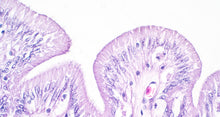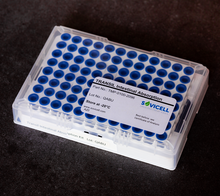The TRANSIL Intestinal Absorption kit measures the affinity of drugs to phosphatidylcholine membranes. It is not only a screening tool to predict intestinal permeability coefficients, but also to predict compounds’ tissue binding. As drug-membrane interactions are key to both the process of membrane permeability and to binding to and permeating into the cell membranes of tissues the assay kit is an ideal tool to predict intestinal permeability rates as well as the volume of distribution early in drug discovery phase. Internal quality controls provide easy assessment of recovery, experiment and data quality.
The kit consists of ready-to-use 96 well microtiter plates. One plate can be used for measuring membrane affinity and permeability of up to 12 compounds. The assay requires only 5 steps: (i) addition of drug candidate, (ii) mixing and incubation for 12 minutes, (iii) removal of beads by centrifugation, (iv) sampling of supernatant, and (v) quantification of drug candidate.
 Figure 1: Human intestinal permeability rates obtained by caco-2 experiments and predicted by a model based on the membrane affinity and polar surface area.
Figure 1: Human intestinal permeability rates obtained by caco-2 experiments and predicted by a model based on the membrane affinity and polar surface area.  Figure 2: Comparison of TRANSIL predicted volume of distribution (Vss) with literature data. Vss is predicted based on the measured on the membrane affinity measurement and plasma protein binding (fraction unbound).
Figure 2: Comparison of TRANSIL predicted volume of distribution (Vss) with literature data. Vss is predicted based on the measured on the membrane affinity measurement and plasma protein binding (fraction unbound).  Figure 3: Illustration of the impact of a membrane’s ionization state on its membrane affinity comparing TRANSIL beads with dialysis with erythrocytes. TRANSIL beads exhibit the same pH dependence as erythrocyte membranes.
Figure 3: Illustration of the impact of a membrane’s ionization state on its membrane affinity comparing TRANSIL beads with dialysis with erythrocytes. TRANSIL beads exhibit the same pH dependence as erythrocyte membranes.








